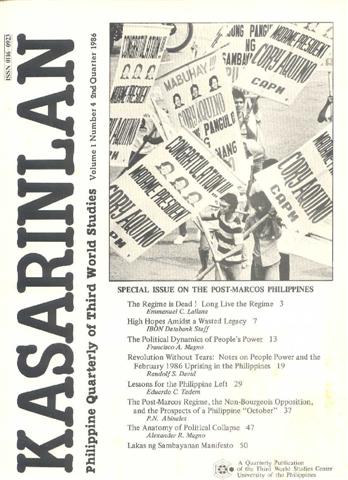Revolution without Tears: Notes on People Power and the February 1986 Uprising in the Philippines
Abstract
This paper provides a critical analysis of the events that led and succeeded Marcos’ deposition. It argues that the fall of Marcos was sudden and dramatic, having caught everyone unprepared. Key figures such as Ramos and Enrile heading the reformist military; Cardinal Sin representing the Church; the middle class and the resulting interaction among all these actors played a significant role in influencing the turn of events. Bringing into the picture the United States, there is also the issue suggesting that the entire thing was scripted by the CIA. However, what really won the revolution was the fact that civilians worked hand in hand with the reformist military. It was out of this that the revolution gained its participatory character. Since it was “everybody’s revolution” and not just the military’s, the whole process was ensured that it would be non-violent. The presence of the following conditions provides a possible explanation as to why the events did not lead to a military coup: professionalism of the military; absence of mass support for the military due to its identification with the dictatorship; and the presence of a popular civilian alternative, that of Corazon Aquino. Though largely celebrated, the people power was beset by weaknesses. People power was unorganized and had no common ideology. It was bolstered by an interesting form of religiosity and became an issue of moral righteousness. This made the whole issue simply a battle between good and evil, and nothing more. Setting such a precedent, things can go wrong unless people power is organized and stabilized. The paper then identifies the many challenges the country in general, and the Aquino government in particular, is faced with. Furthermore, it suggests possible solutions for the society’s reconstruction. Two main issues in that agenda are political consolidation and economic reconstruction.
Published
2007-11-20
How to Cite
DAVID, Randolf S..
Revolution without Tears: Notes on People Power and the February 1986 Uprising in the Philippines.
Kasarinlan: Philippine Journal of Third World Studies, [S.l.], v. 1, n. 4, p. 19-28, nov. 2007.
ISSN 2012-080X.
Available at: <https://journals.upd.edu.ph/index.php/kasarinlan/article/view/526>. Date accessed: 03 oct. 2025.
Issue
Section
Features
Keywords
civilian-military relations, CIA, revolution, reformist military, political consolidation, economic reconstruction
By submitting a manuscript, the authors agree that the exclusive rights to reproduce and distribute the article have been given to the Third World Studies Center.



